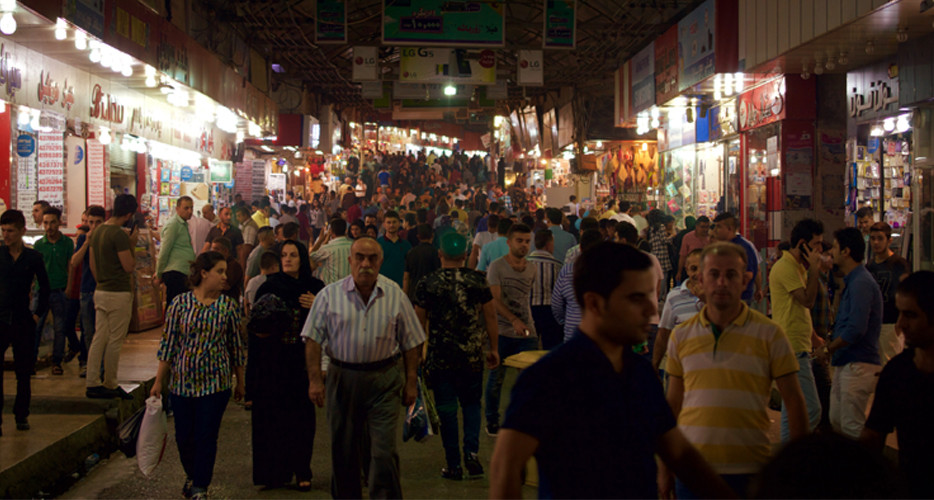
PEREGRAF
Kavin Ismail travels to the northern Iraqi city of Mosul every month to buy a carload of home and food supplies that cost half of what it costs him at his hometown of Duhok in the autonomous Kurdistan Region.
"Due to the high price of supplies in Duhok, we go to Mosul twice a month, where we shop and buy goods for our daily needs," Ismail told Peregraf. "The price is much cheaper there, which has forced some of the residents of Duhok province to go to Mosul [to shop]," he added.
Ismail says that one bottle of cooking oil in Duhok is for 2,500 to 3,000 Iraqi dinars [$2], but in Mosul it costs about 1,000 to 1,500 dinars.
"I think if the Duhok security checkpoints don't prevent them from bringing in a lot of goods, most Duhok residents will still buy their needs in Mosul," Kavin noted.
Mosul is the capital city of Nineveh province. The city took heavy damage during the Islamic State control of the area between June 2014 to July 2017. Parts of the city still lie in ruins and are yet to be recovered.
"The people of Duhok and Kurdistan are going to Mosul to shop, although the security situation in Mosul is not good and infrastructure has not been rebuilt, but prices are cheap," said Mamo Omar, an elderly Duhok man who says goods in Mosul have been cheaper for as long as he can remember.
"A doctor’s appointment in Duhok costs 20,000 to 25,000 dinars, medicine is at a high price, while the same medicine and treatment in Mosul is less than half the price, and a doctor’s appointment costs 7,000 to 10,000 dinars," Omar said.
Omar however said that there are limits on how much each car can take across the checkpoint, noting that the Kurdistan Region doesn't allow more than one sack of flour or one sack of rice to be brought in from Mosul.
In addition to supplies, drivers started refueling their cars in Iraqi-controlled areas near the Kurdistan Region last year, where the price of one liter of gasoline there is 450 dinars and while in Duhok it costs over 850 dinars.
Karwan Doski, a Kurdish driver says "because of Duhok drivers, the fuel station only gives us 40 liters of petrol near the Duhok border," he said. "Duhok checkpoints won't allow us to bring gasoline in barrels and bottles, and they won't even allow us to bring five liters," he added.
Peregraf reached out to security officials at the checkpoint but they were not available to comment.
"We have been warned that fuel should not enter Duhok, and the Erbil checkpoints will not allow it," a security source said on the condition of anonymity. "When citizens return from Mosul, they complain that Arab checkpoints in Mosul allow bringing fuel, but Kurdish checkpoints are preventing large amounts of supplies from being brought in," he said.
Matin Suleiman, a tradesman from Duhok said "part of the reason" why prices are high in Duhok is the lack of control by the government over customs taxes and rental fees, adding that in some areas where rent is cheaper, prices are also cheaper.
"Fuel and medical treatment can also be like Mosul in terms of price," said Suleiman.
Last year, the Kurdistan Regional Government’s Trade Control department shut down more than 3,000 shops in Duhok due to selling overpriced items.
"It is true that there are price differences in Duhok compared to Mosul, but in Duhok renting shops are more expensive, even neighborhoods are different in pricings, which has caused a lot of pressure and we can't put too much pressure on shopkeepers," said Shukri Shafiq, head of the Trade Control directorate in Duhok told Peregraf.
Duhok is an important business center for Nineveh province and other areas of the Kurdistan Region and Iraq, as it has two official border crossings, including one with Turkey.
"The high price of the daily necessities of citizens in Duhok is due to the lack of competition between traders," Ramazan Slevani, an economist, told Peregraf. "There are some party-affiliated businessmen who have monopolized the market and are increasing the price of goods in their own way, while controlling the market and traders are very weak."
Duhok province has a population of more than 1.3 million and the highest poverty rate in the Kurdistan Region. According to the Kurdistan Region’s Statistics Office, Duhok’s poverty rate is at 8.6 percent, Erbil is at 6.7 percent and Sulaimaniyah is at 4.46 percent.
This is while more than half of the Kurdistan Region’s oil is produced in Duhok. Official statistics from the ministry of natural resources, say that up to 54 percent of the Region’s oil is produced in Duhok’s fields, which is around 250,000 barrels of the 450,000 barrels produced per day in the Kurdistan Region.